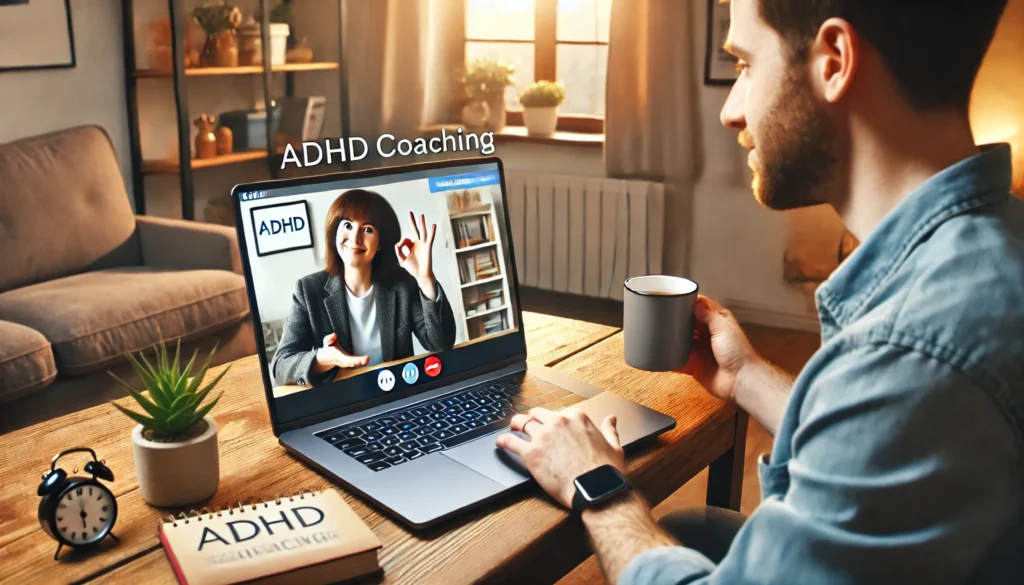ADHD coaching is a specialized field focused on helping individuals with ADHD develop skills to manage their symptoms and improve their quality of life. Unlike traditional therapy, which may focus on emotional and psychological aspects, ADHD coaching is action-oriented and centers on practical solutions.
You may also like: Enhancing Concentration: Strategies for ADHD
The Role of an ADHD Coach
An ADHD coach works with clients to set goals, establish routines, and develop strategies that capitalize on their strengths while addressing their challenges. This collaborative process involves understanding the unique ways in which ADHD affects each individual and tailoring approaches to meet their specific needs. Coaches often employ a variety of tools and techniques, such as time management strategies, organizational skills, and motivation enhancement, to help clients succeed.
Moreover, ADHD coaches serve as accountability partners, providing the structure and support that individuals with ADHD often need. They help clients track their progress, adjust their strategies as necessary, and celebrate their successes. This continuous feedback loop fosters growth and adaptation, enabling clients to thrive in various aspects of their lives.
Why ADHD Coaching is Essential
ADHD can impact various aspects of life, including academic performance, career advancement, and personal relationships. Coaching provides the tools and support necessary to navigate these challenges effectively. By focusing on skill-building and accountability, ADHD coaching empowers individuals to make positive changes and reach their potential.
The structured nature of coaching helps clients create systems that work for them, leading to improved productivity and decreased stress. Additionally, the personalized attention from a coach can help identify and address specific obstacles that may be hindering progress. With the right guidance, individuals with ADHD can learn to harness their unique strengths and turn potential weaknesses into areas of opportunity.
Differentiating ADHD Coaching from Other Interventions
While ADHD coaching shares similarities with other interventions, such as therapy and mentoring, it is distinct in its focus and methodology. Unlike therapy, which often addresses emotional and psychological healing, ADHD coaching is future-focused, emphasizing practical strategies for managing daily life. This action-oriented approach is designed to help clients achieve tangible outcomes in their personal and professional lives.
Mentoring, on the other hand, is usually more informal and may not be specifically tailored to the needs of individuals with ADHD. ADHD coaching offers a structured, evidence-based framework that is customized to each client’s unique challenges and goals. By understanding these distinctions, individuals can choose the most appropriate support system to meet their needs.

Getting Certified: ADHD Life Coach Certification
Becoming a certified ADHD coach requires a combination of education, training, and experience. Several programs offer certification that equips coaches with the knowledge and skills needed to effectively support clients with ADHD.
Choosing the Right ADHD Coach Certification
When selecting a certification program, consider the curriculum, accreditation, and support offered. Look for programs that provide comprehensive training in ADHD-specific coaching techniques, as well as a solid foundation in coaching principles. Some of the best ADHD coaching programs are recognized by reputable organizations such as the International Coach Federation (ICF) or the Center for Credentialing & Education (CCE).
Additionally, consider the program’s teaching methods and whether they align with your learning style. Some programs offer hands-on workshops and practical exercises, while others may focus more on theoretical knowledge. The right program should not only meet your educational needs but also provide ongoing support and resources to help you succeed in your coaching career.
Popular ADHD Coaching Programs
Several programs stand out for their rigorous training and positive outcomes. These include:
- ADD Coach Academy (ADDCA): Known for its comprehensive curriculum and experienced faculty, ADDCA offers a well-rounded approach to ADHD coaching. The program emphasizes the development of both personal and professional coaching skills, ensuring that graduates are well-equipped to handle a variety of client situations.
- ADD Coach Certification Training (ACCT): This program focuses on practical strategies and techniques, helping coaches develop effective coaching practices. ACCT offers interactive training sessions that encourage participants to apply what they’ve learned in real-world scenarios, enhancing their ability to support clients effectively.
- International ADHD Coach Training Center (IACTCenter): Offers a blend of online and in-person training, providing flexibility for aspiring coaches. The program integrates the latest research and best practices in ADHD coaching, ensuring that participants receive a cutting-edge education that prepares them for success.
Understanding the Certification Process
The certification process typically involves completing a series of courses, passing examinations, and gaining practical experience. Each program has its own requirements, but most include a combination of classroom instruction, supervised practice, and independent study. This comprehensive approach ensures that candidates develop a deep understanding of ADHD and the skills needed to support clients effectively.
Furthermore, some programs offer mentorship opportunities, where candidates work closely with experienced coaches to refine their skills and build confidence. These mentorships provide invaluable insights into the day-to-day realities of ADHD coaching and offer a supportive environment for growth and learning.
Exploring ADHD Group Coaching
Group coaching is an innovative approach that leverages the power of community and shared experiences. It offers a dynamic environment where individuals with ADHD can learn from each other and work together to overcome common challenges.
Benefits of Group Coaching
Group coaching provides a supportive network where participants can share their experiences, gain new perspectives, and develop social skills. This collective approach fosters a sense of belonging and accountability, which can enhance motivation and engagement. The group setting allows individuals to learn from the successes and challenges of their peers, offering diverse insights and strategies that may not be available in one-on-one coaching.
Moreover, group coaching can be more cost-effective than individual sessions, making it accessible to a wider audience. It also encourages participants to practice social interaction and communication skills in a safe and supportive environment, which can be particularly beneficial for individuals with ADHD who may struggle in social situations.
Implementing Group Coaching Strategies
To effectively facilitate group coaching sessions, coaches should focus on creating a safe and inclusive environment. This involves establishing clear guidelines, encouraging open communication, and ensuring that all participants feel heard and respected. Techniques such as role-playing, peer feedback, and collaborative problem-solving can enhance the group coaching experience.
Coaches should also be adept at managing group dynamics, recognizing when to intervene and when to allow the group to self-regulate. This balance is crucial for maintaining a productive and positive atmosphere. Tailoring activities to the specific needs and interests of the group can also increase engagement and foster a sense of ownership among participants.
Measuring Success in Group Coaching
Success in group coaching can be measured through various metrics, such as participant satisfaction, skill acquisition, and goal achievement. Regular feedback from participants can help coaches refine their approach and address any issues that may arise. Additionally, tracking progress against established goals provides tangible evidence of the group’s development and can motivate participants to continue their efforts.
Coaches may also use assessments or self-reflection exercises to help participants recognize their growth and identify areas for further improvement. Celebrating individual and group achievements reinforces the value of the coaching process and encourages continued commitment to personal development.

Online ADHD Coaching: Accessibility and Convenience
The rise of digital technology has made online ADHD coaching more accessible than ever. This format offers flexibility and convenience, allowing individuals to receive coaching from the comfort of their own homes.
Advantages of Online Coaching
Online coaching breaks down geographical barriers, providing access to a wider range of coaches and resources. It also accommodates busy schedules, enabling clients to engage in coaching sessions at times that suit them best. Additionally, online platforms often offer tools and resources that enhance the coaching experience, such as digital goal-setting and progress tracking.
The virtual nature of online coaching can also create a comfortable environment for individuals who may feel anxious or self-conscious in face-to-face settings. Clients can engage with their coach from a familiar space, which may enhance openness and engagement during sessions. Furthermore, online coaching can easily integrate multimedia resources, such as videos and interactive exercises, to enrich the learning experience.
Choosing an ADHD Coach Online
When selecting an online ADHD coach, it’s important to consider their credentials, experience, and coaching style. Look for coaches who are certified and have a proven track record of success. Reading reviews and testimonials can also provide valuable insights into a coach’s effectiveness and approach.
Additionally, consider the technological aspects of online coaching, such as the platforms used and the availability of support for technical issues. A seamless and user-friendly experience is essential for maintaining focus and engagement during sessions. Ensure that the coach’s communication style and availability align with your preferences to foster a productive and supportive coaching relationship.
Overcoming Challenges in Online Coaching
While online coaching offers many benefits, it also presents unique challenges, such as potential technical issues and the lack of in-person interaction. Coaches and clients must be prepared to address these challenges by establishing clear communication protocols and contingency plans for technical difficulties.
Building rapport in a virtual environment requires intentionality and creativity. Coaches can use video calls, instant messaging, and other digital tools to connect with clients on a personal level. Encouraging regular check-ins and creating opportunities for informal interactions can also help strengthen the coach-client relationship and enhance the overall coaching experience.
Becoming an ADHD Coach: Steps and Considerations
If you’re interested in becoming an ADHD coach, there are several steps to consider.
How to Become an ADHD Coach
- Research and Choose a Certification Program: Start by exploring different certification programs and selecting one that aligns with your goals and values. Consider factors such as program content, reputation, and cost.
- Complete Training and Certification: Enroll in a program and complete the necessary coursework and training requirements. This may include attending workshops, participating in practical exercises, and passing examinations.
- Gain Practical Experience: Build your coaching skills by working with clients under supervision, participating in internships, or volunteering. Real-world experience is crucial for developing confidence and competence as a coach.
- Establish Your Practice: Once certified, start building your coaching practice by creating a business plan, marketing your services, and networking with other professionals. Consider joining professional organizations to expand your connections and access additional resources.
Continuing Education and Professional Development
The field of ADHD coaching is constantly evolving, and it’s important to stay informed about the latest research and techniques. Engage in ongoing professional development by attending workshops, conferences, and webinars. This not only enhances your skills but also demonstrates your commitment to providing the best possible support to your clients.
Additionally, consider pursuing advanced certifications or specializations to broaden your expertise and offer more targeted services. Staying connected with the ADHD coaching community through forums, online groups, and professional associations can also provide valuable insights and support as you grow your practice.
Ethical Considerations in ADHD Coaching
As an ADHD coach, it’s essential to adhere to ethical standards and guidelines to ensure the well-being of your clients. Familiarize yourself with the ethical codes of relevant professional organizations and integrate these principles into your practice. This includes maintaining confidentiality, setting clear boundaries, and obtaining informed consent.
Additionally, be aware of your own limitations and know when to refer clients to other professionals, such as therapists or medical practitioners, for issues beyond your expertise. Prioritizing your clients’ best interests and fostering a transparent, respectful relationship will build trust and enhance the effectiveness of your coaching.

Conclusion: The Impact of ADHD Coaching
ADHD coaching is a powerful tool that can transform lives. By equipping individuals with the skills and strategies they need to manage their symptoms, coaches play a vital role in helping clients achieve their goals and improve their quality of life. Whether you’re a health and wellness coach, a science journalist, or a biohacker, understanding the nuances of ADHD coaching can enhance your ability to provide valuable insights and support to those who need it most.
With the right training and resources, you can make a meaningful difference in the lives of individuals with ADHD, guiding them toward a future filled with possibility and success. By embracing the principles of ADHD coaching and committing to ongoing learning and development, you can empower your clients to unlock their full potential and lead fulfilling, productive lives.
Further Reading:
Become a Certified ADHD and Life Coach
NeurodiversityCoach für ADHS/ Autismus-ADHD/Autism Coaching Online
Important Note: The information contained in this article is for general informational purposes only, and should not be construed as health or medical advice, nor is it intended to diagnose, prevent, treat, or cure any disease or health condition. Before embarking on any diet, fitness regimen, or program of nutritional supplementation, it is advisable to consult your healthcare professional in order to determine its safety and probable efficacy in terms of your individual state of health.
Regarding Nutritional Supplements Or Other Non-Prescription Health Products: If any nutritional supplements or other non-prescription health products are mentioned in the foregoing article, any claims or statements made about them have not been evaluated by the U.S. Food and Drug Administration, and such nutritional supplements or other health products are not intended to diagnose, treat, cure, or prevent any disease.


